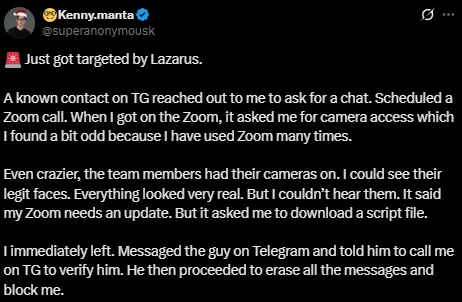
Manta Network co-founder Kenny Li was recently targeted in a Zoom phishing attack. He almost fell for it but noticed something was wrong and left the call in time. The attack was likely done by the Lazarus Group, a hacking group linked to North Korea. This shows that crypto leaders are facing more danger and that hackers are using more sneaky tricks to fool people.

Kenny Li recently experienced a smart and sneaky phishing attack during a Zoom call. He got a meeting invite from someone he knew, so he joined without thinking anything was wrong. The person on the call had their camera on and looked real, but there was no sound. Then, Li was asked to download a strange file, which was claimed to be a Zoom update. Because of his suspicions, he recommended using a different platform, such as Telegram or Google Meet. The individual immediately blocked him and erased all the messages, indicating that something was wrong.
What made this attack tricky was that the person in the video looked like someone Li knew. It turns out that the hacker was not using a phoney or artificial intelligence-generated face, but rather a real video of that individual. At first, this made the call seem normal. Later, Li discovered that a group known as Lazarus had hacked the real person's account. Because Li is well-known in the crypto world, it seems he was specifically targeted. This shows how dangerous and convincing these kinds of phishing attacks can be.
Li wasn’t the only crypto leader targeted by this smart phishing scam. Others in the industry have faced similar attacks. For example, Giulio Xiloyannis, co-founder of Mon Protocol, joined a fake Zoom call where a hacker tried to get him to download malware by pretending there were tech issues.
David Zhang, co-founder of Stably and another cryptocurrency entrepreneur, fell victim to a similar scam. To persuade Zhang to download malicious software, the attacker first joined a Google Meet call before making up a reason to move to a different Zoom link. Thanks to his quick thinking, Zhang avoided falling victim to the attack.
These attacks show that the Lazarus Group is specifically targeting the crypto industry, where executives are often bombarded with meeting requests and may be more likely to let their guard down.
The Lazarus Group has been behind many major cyberattacks, like the Bybit and Ronin Network hacks. They are known for using clever tricks to steal millions of dollars from crypto companies and people.
The recent Zoom phishing attempts are just the latest in a series of cybercrime operations attributed to Lazarus. In January 2025, governments from South Korea, Japan, and the United States issued joint warnings about the increasing threat from this group. These attacks are a reminder of the ongoing need for heightened cybersecurity in the crypto industry.
The recent wave of Zoom phishing attacks highlights the growing threat posed by the Lazarus Group, especially toward high-profile figures in the crypto industry. As hackers become more skilled at impersonating trusted contacts and using realistic video tactics, individuals and organizations must stay vigilant. These incidents serve as a strong reminder that even familiar faces and platforms can be part of sophisticated scams, making cybersecurity awareness more important than ever.

Mohit Raghuwanshi is an Indian journalist working at Coin Gabbar’s news desk, passionately following the ever-evolving crypto market. With a keen interest in blockchain technology and digital assets, he delivers in-depth reports on industry trends, regulations, and market movements. He holds a bachelor's degree in Journalism and Mass Communication and previously worked as a content writer at a PR agency, honing his skills in crafting compelling narratives and analyzing financial markets.